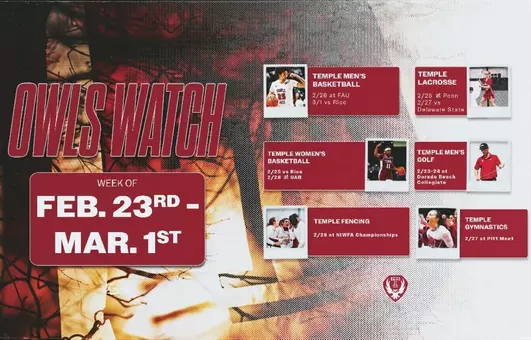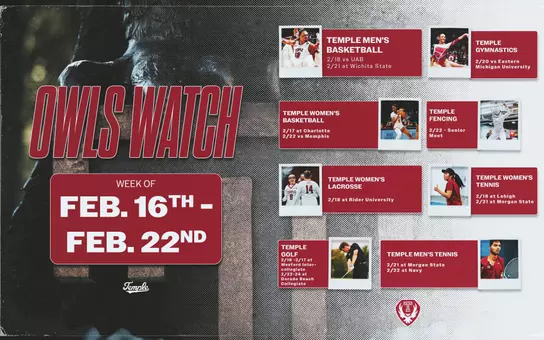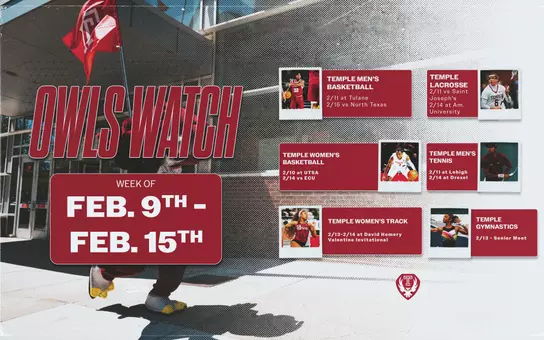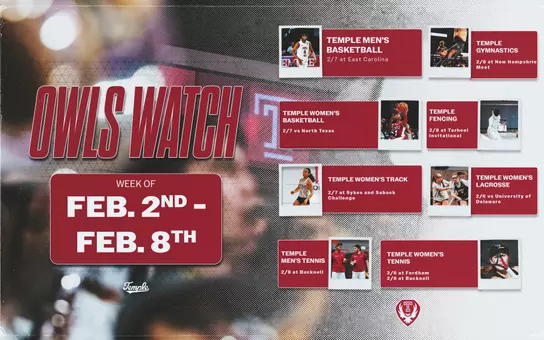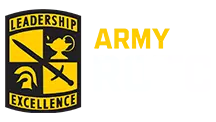Temple University Athletics
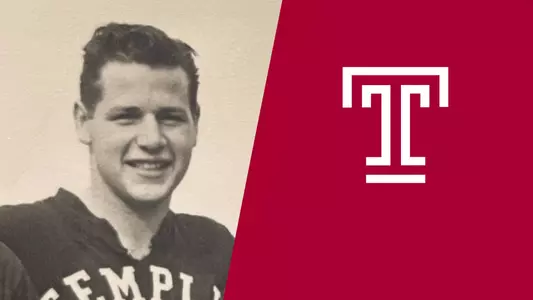
Hall of Fame Spotlight: Jack Dunn
1.31.24 | General, Men's Soccer
Inducted into the Temple Athletics Hall of Fame in 1975, Jack Dunn is one of the greatest soccer players in school and Philadelphia history.
Dunn earned All-American honors all four years he was an Owl (1951-54). He was instrumental in helping the Owls compile an amazing 32-3-2 record during his four seasons on the pitch. Temple would capture two national championships (1951 and 1953) during his time.
The Philadelphia native, who led the Owls in scoring all four seasons, also was a member of the 1952 United States Olympic Team that played in Helsinki, Finland.
Following his career on North Broad Street, Dunn played on four professional championship teams and played or coached 18 amateur soccer championship teams. He served as the first head soccer coach at St. Joseph's College (now University) and developed nine All-Americans. His overall record of 120-57-3 is a school record and his 1966, 1971 and 1972 teams are the only ones to qualify for the NCAA Tournament in the school's history.
Dunn, who served on selection committees to pick athletes to represent United States in international matches, also was a member of the United German Hungarian Soccer Club that won the 1965 National Amateur Cup. A three-time All-Scholastic standout at Northeast Public High School, he is retired and living in South Jersey.
Talk about your early years, playing soccer with the Lighthouse Boys Club?
"The Lighthouse Boys Club was the premier soccer club for youth at the time. It was started by a very well-off lady, Esther Kelly, who moved into the Kensington area and was horrified by all the barrooms and poor places in the area while there was nothing for the children. So, she got her family behind her and purchased 17 acres of property to make the Lighthouse Boys Club Field. This became an oasis of goodness in this industrial area.
The cheapest game to play and a game a lot of people played in that area was soccer. So, they started leagues at the Club and every Saturday morning they would have hundreds of kids up at Front and Erie (streets) on the Lighthouse Boys Club Field playing soccer.
It was a wonderful organization. It is where I learned soccer and just about everybody from Philadelphia who played soccer was from Lighthouse or had some affiliation with it."
Why did you choose to attend Temple and play soccer under Hall of Fame Coach Pete Leaness?
"I was first recruited by Penn State. I was there for five days and things did not turn out the way I was led to believe so I walked out. I had a relationship with Pete (Leaness) and once I returned to Philadelphia I took the El to his house, signed the papers and that's how I became a Temple Man.
Talk about your career at Temple. You earned All-America honors all four years and won two National Championships and the team posted an incredible 32-3-2 record? What stands out the most now?
"What stands out the most? The amount of good players (at Temple) …At that time Northeast High School and North Catholic were the two best high school teams in the city. That is where he recruited, and we ended up winning two National Championships.
The heart of our team played together at Lighthouse Boys Club and won the Junior Championship two years in a row. So that group of guys were used to winning championships and brought that mentality to Temple."
You were a member of the 1952 United States Olympic Team that competed in Helsinki, Finland. How did it feel to represent your country on the world stage?
"It was truly special to represent the United States at the highest level. The Olympics was always the best for a soccer player because the Olympics came with some money. The problem with soccer is there was never any money in it.
I was brought up in a soccer family, lived in a soccer neighborhood, so as a player you were always aware that you were representing somebody whether it was Lighthouse Boys Club, Kensington Blue Bell or the United States."
After earning your degree, you served in the military. Talk about your time in the service?
"I was in the service, but they brought over the Olympic team, so I was assigned to the team. We started our tour in Helsinki and then played some professional teams in Europe.
The experience of representing the United States was one in a million. It was a very nice tour and well financed. There was a soccer movement within the Olympics that had some financial backing behind it. This helped bring people less fortunate into this game as well as sending us all over Europe to play."
Talk about your professional soccer career, where did you play and what stands out the most now?
"I had a professional career, but I would use the term 'professional' loosely for the nickels and dimes we were paid.
It did not bother me as I always wanted to be a businessman. I never wanted to be a soccer star or a soccer professional. My brother, Jim, who was six years older than I was and a superb player, played professionally for 15-20 years and he never gave up his day job,"
You were the first head coach at Saint Joseph's, compiling 120 wins over an 18-year career with three teams making the NCAA Tournament and a still standing winning percentage of .658. What are your memories of your time building the program and why did you decide to retire?
"I always thought coaching might be in my future. I had just got out of the service and was in the executive training program at Gulf Oil, which was located on City Line Avenue. One of the guys at Gulf was also a very good soccer referee, John Burns. So, he is at an area business seminar and happens to be sitting at lunch with the Athletic Director of Saint Joseph's, George Bertlesman. He tells Burns he is looking for a soccer coach and he recommended me. A week later I am signed up and coaching St. Joe's.
It was an interesting interview. I go to St. Joe's and say, 'Do I have this job?'. He laughs and says, 'Do you have it, you and Burnsy are the only two soccer people I know. You had it the moment you walked inside the door.'"
What did you do following your coaching career?
"Gulf Oil was the reason I retired from coaching. I was first moved to New York to handle the sales force there. That (move) and business pressures were building to the point where it was either my career with Gulf or with soccer. So, I chose business over coaching.
I would remain with Gulf Oil the remainder of my career."
Dunn earned All-American honors all four years he was an Owl (1951-54). He was instrumental in helping the Owls compile an amazing 32-3-2 record during his four seasons on the pitch. Temple would capture two national championships (1951 and 1953) during his time.
The Philadelphia native, who led the Owls in scoring all four seasons, also was a member of the 1952 United States Olympic Team that played in Helsinki, Finland.
Following his career on North Broad Street, Dunn played on four professional championship teams and played or coached 18 amateur soccer championship teams. He served as the first head soccer coach at St. Joseph's College (now University) and developed nine All-Americans. His overall record of 120-57-3 is a school record and his 1966, 1971 and 1972 teams are the only ones to qualify for the NCAA Tournament in the school's history.
Dunn, who served on selection committees to pick athletes to represent United States in international matches, also was a member of the United German Hungarian Soccer Club that won the 1965 National Amateur Cup. A three-time All-Scholastic standout at Northeast Public High School, he is retired and living in South Jersey.
Talk about your early years, playing soccer with the Lighthouse Boys Club?
"The Lighthouse Boys Club was the premier soccer club for youth at the time. It was started by a very well-off lady, Esther Kelly, who moved into the Kensington area and was horrified by all the barrooms and poor places in the area while there was nothing for the children. So, she got her family behind her and purchased 17 acres of property to make the Lighthouse Boys Club Field. This became an oasis of goodness in this industrial area.
The cheapest game to play and a game a lot of people played in that area was soccer. So, they started leagues at the Club and every Saturday morning they would have hundreds of kids up at Front and Erie (streets) on the Lighthouse Boys Club Field playing soccer.
It was a wonderful organization. It is where I learned soccer and just about everybody from Philadelphia who played soccer was from Lighthouse or had some affiliation with it."
Why did you choose to attend Temple and play soccer under Hall of Fame Coach Pete Leaness?
"I was first recruited by Penn State. I was there for five days and things did not turn out the way I was led to believe so I walked out. I had a relationship with Pete (Leaness) and once I returned to Philadelphia I took the El to his house, signed the papers and that's how I became a Temple Man.
Talk about your career at Temple. You earned All-America honors all four years and won two National Championships and the team posted an incredible 32-3-2 record? What stands out the most now?
"What stands out the most? The amount of good players (at Temple) …At that time Northeast High School and North Catholic were the two best high school teams in the city. That is where he recruited, and we ended up winning two National Championships.
The heart of our team played together at Lighthouse Boys Club and won the Junior Championship two years in a row. So that group of guys were used to winning championships and brought that mentality to Temple."
You were a member of the 1952 United States Olympic Team that competed in Helsinki, Finland. How did it feel to represent your country on the world stage?
"It was truly special to represent the United States at the highest level. The Olympics was always the best for a soccer player because the Olympics came with some money. The problem with soccer is there was never any money in it.
I was brought up in a soccer family, lived in a soccer neighborhood, so as a player you were always aware that you were representing somebody whether it was Lighthouse Boys Club, Kensington Blue Bell or the United States."
After earning your degree, you served in the military. Talk about your time in the service?
"I was in the service, but they brought over the Olympic team, so I was assigned to the team. We started our tour in Helsinki and then played some professional teams in Europe.
The experience of representing the United States was one in a million. It was a very nice tour and well financed. There was a soccer movement within the Olympics that had some financial backing behind it. This helped bring people less fortunate into this game as well as sending us all over Europe to play."
Talk about your professional soccer career, where did you play and what stands out the most now?
"I had a professional career, but I would use the term 'professional' loosely for the nickels and dimes we were paid.
It did not bother me as I always wanted to be a businessman. I never wanted to be a soccer star or a soccer professional. My brother, Jim, who was six years older than I was and a superb player, played professionally for 15-20 years and he never gave up his day job,"
You were the first head coach at Saint Joseph's, compiling 120 wins over an 18-year career with three teams making the NCAA Tournament and a still standing winning percentage of .658. What are your memories of your time building the program and why did you decide to retire?
"I always thought coaching might be in my future. I had just got out of the service and was in the executive training program at Gulf Oil, which was located on City Line Avenue. One of the guys at Gulf was also a very good soccer referee, John Burns. So, he is at an area business seminar and happens to be sitting at lunch with the Athletic Director of Saint Joseph's, George Bertlesman. He tells Burns he is looking for a soccer coach and he recommended me. A week later I am signed up and coaching St. Joe's.
It was an interesting interview. I go to St. Joe's and say, 'Do I have this job?'. He laughs and says, 'Do you have it, you and Burnsy are the only two soccer people I know. You had it the moment you walked inside the door.'"
What did you do following your coaching career?
"Gulf Oil was the reason I retired from coaching. I was first moved to New York to handle the sales force there. That (move) and business pressures were building to the point where it was either my career with Gulf or with soccer. So, I chose business over coaching.
I would remain with Gulf Oil the remainder of my career."
Ep. 40: Women's Rowing Alum Kathleen Stengel
Monday, February 23
2026 Temple Invitational - Strip 2
Sunday, February 22
2026 Temple Invitational - Strip 1
Sunday, February 22
Ep. 39: Women's Rowing Senior Amanda Morelli
Wednesday, February 18


